Kisses to chaos: murder behind mayhem in Hong Kong
A teen with a secret who went on holiday with her lover and wound up dead was catalyst for Hong Kong chaos.
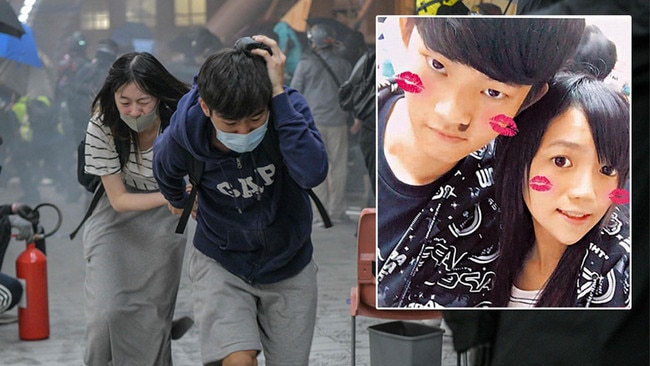
The Hong Kong girl decorated her Facebook profile with love hearts and butterflies. A happy snap with her young lover in the frame bears photoshopped red-lipstick kisses.
At 19 she was as young as many of the masked students in Hong Kong’s protests in which radicals have attacked police with petrol bombs, pavers and arrows, destroyed public infrastructure, killed an elderly man with a brick and even set alight a civilian who challenged the wanton vandalism.
But before any of this mayhem, the teen carried a secret. Poon Hiu-wing was a few months pregnant. Her parents were as unaware as her boyfriend, Chan Tong-kai, when the couple flew to Taiwan for a holiday in February last year.
READ MORE: Hong Kong protesters young, scared and waiting for the end | Hardcore rioters defy Hong Hong police
The bad seed for Hong Kong’s descent into mayhem was quietly sown on that trip. Poon’s life was brutally extinguished with a blow to the head, strangulation and the dumping of her body.
“At home, she was a good daughter. In school, she was a good student,” her mother said.
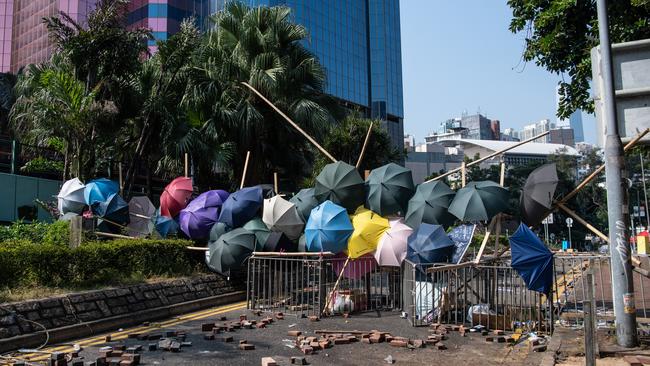
The facts surrounding a largely forgotten teenage girl’s murder are crucial to understanding how Hong Kong reached this strife-torn juncture. Her murder was a catalyst for unleashing the pent-up anger in Hong Kong — but not because the protesters have tried and failed to seek justice for Poon. She has been collateral damage. Her family’s demands for justice are no longer heard.
The mishandling of her case simmers now as parts of Hong Kong burn; its streets in trouble spots strewn with the wreckage of public and private property; its economy suffering and its reputation for stability shattered.
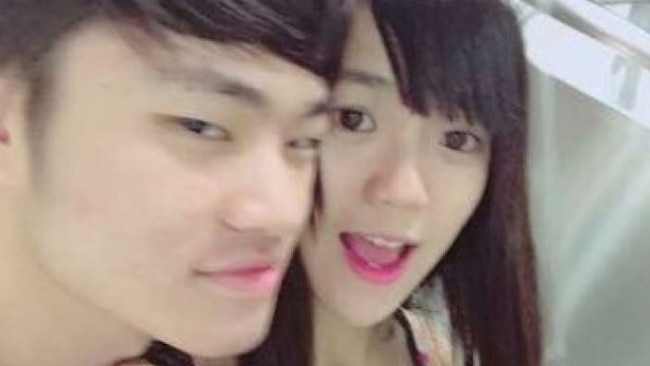
After Poon’s remains were found in bushes on the outskirts of Taipei, an autopsy revealed the tiny skeleton in her body. Her killer has confessed. It should have been an open-and-shut case — perhaps even a textbook example of the effectiveness of the rule of law in two Chinese cities, each boasting a robust judiciary independent of the Chinese Communist Party’s rubberstamp judiciary of the mainland.
But there was one big problem. When Poon was still a missing teenager in February last year, her killer had left Taiwan’s jurisdiction and re-entered Hong Kong.
The killer was Chan, her boyfriend, who got on with his life in Hong Kong. At first he claimed he had last seen her in Taipei, alive and well. He used his dead girlfriend’s ATM card to drain her account of cash, raising false hopes in her family that she was alive. He stole her camera and iPhone.
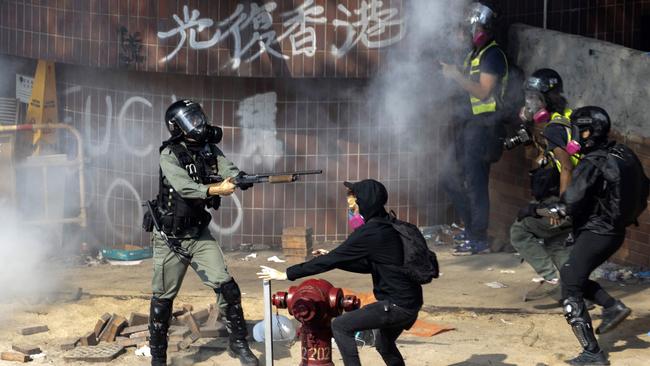
When Hong Kong police questioned him a month later he said they had a row over a new pink suitcase and soon resolved their differences. They made love in the Taipei hotel room that day.
Early the following morning, February 17, the day Poon was to have flown home, they argued again. This time, he told police, she revealed her pregnancy. He said she showed him footage on her iPhone of her having sex with another young lover.
MORE ON HONG KONG: Mob protesters rule the streets | Tensions must not stop us from Chinese engagement
Enraged, he bashed her head on the wall, strangled the life out of her, folded her small frame into the suitcase, slept, then checked out and took public transport to a station far from the centre of Taipei. He dumped the suitcase with Poon in the bushes.
For a murder prosecution to occur in the country in which Poon was murdered, Chan would have to be extradited to Taiwan.
An extradition was at the heart of the plea issued by Poon’s mother when she told journalists in Hong Kong in February, a year after the murder: “This is the only way justice can be served and until then my daughter cannot rest in peace. What did she do to deserve this? Our family never imagined such a horrible thing could happen to such a nice girl.”
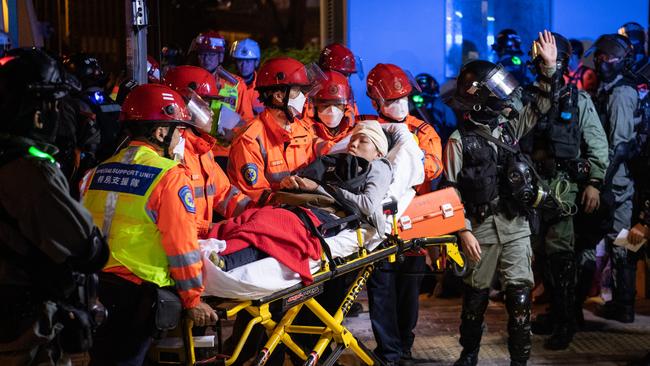
Taiwan’s authorities also wanted Chan back to face justice. They saw him as a fugitive killer.
But since the 1997 handover, Hong Kong officials have achieved formal extradition agreements with only 22 countries — and not Taiwan. Chan could have been sent to Taiwan with a special legal agreement unique to his case but Hong Kong Chief Executive Carrie Lam decided to plough ahead with bold action. She pushed for a rushed, clumsily executed and highly irregular broader new law that would have seen Chan sent back to Taiwan. However, the law also could have resulted in Hong Kong people being dispatched to mainland China.
Mike Rowse, who came to Hong Kong in the 1970s and worked his way from the Independent Commission Against Corruption to the top of the civil service, is the first Westerner from the former British colony to achieve the status of a Chinese national. With deep ties in Hong Kong and Beijing he has welcomed China as the mother country — but he, like many people here, was staggered by Lam’s extradition own-goal.
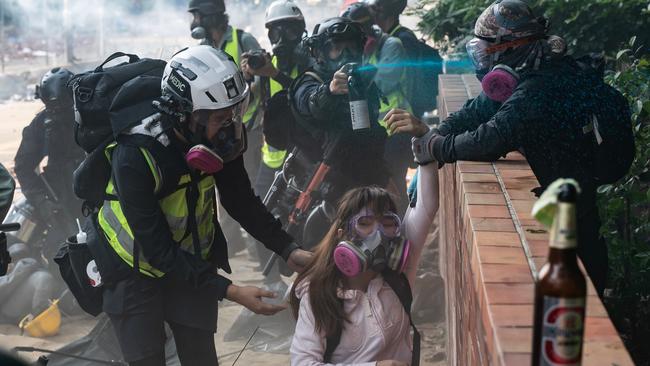
For most Hong Kong people, including those who are pro-China, the mainland justice system is a black hole from which people sometimes never emerge, irrespective of guilt or innocence.
The proposed new law had to be resisted at all costs. The urgency accompanying Lam’s campaign to bring it in aroused suspicions. According to Rowse and his political contacts in Hong Kong, London and China, it was not even a law Beijing asked Lam to introduce.
“Beijing’s attitude was ‘if you can get it done, do it’, but they didn’t initiate it,” he tells The Australian in his suite overlooking the People’s Liberation Army building near central Hong Kong and its Legislative Council.
Rowse says Lam was perceived to be brownnosing to Beijing, perhaps ensuring her appointment for a second term. But he’s adamant she was the architect of the attempted extradition law without nuanced or direct encouragement from China.
“Of course there are a lot of fugitives from the mainland living comfortably in Hong Kong,” he adds. China would dearly like to see them face justice on the mainland for alleged crimes including massive fraud but in Hong Kong they’re out of reach in the absence of the law Lam tried to bring in.
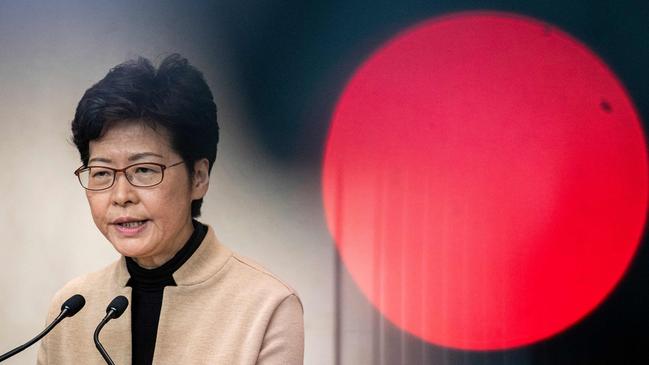
Asked what would have ensued if Lam had heeded the advice of just about everyone, backed down and withdrawn the bill, Rowse says today’s chaos would have been avoided. But by digging in, Lam infuriated much of the population, triggering a huge peaceful protest on June 9 and demonstrations that escalated and never abated. As for Poon’s confessed killer, he walks free in Hong Kong.
The slaying of his girlfriend combined with the Chief Executive’s ham-fisted handiwork to exploit the case for political ends were bad enough. Add rising anger over a range of grievances and the influence of radicals and you see the violent maelstrom that seems beyond Lam’s capacity to control.


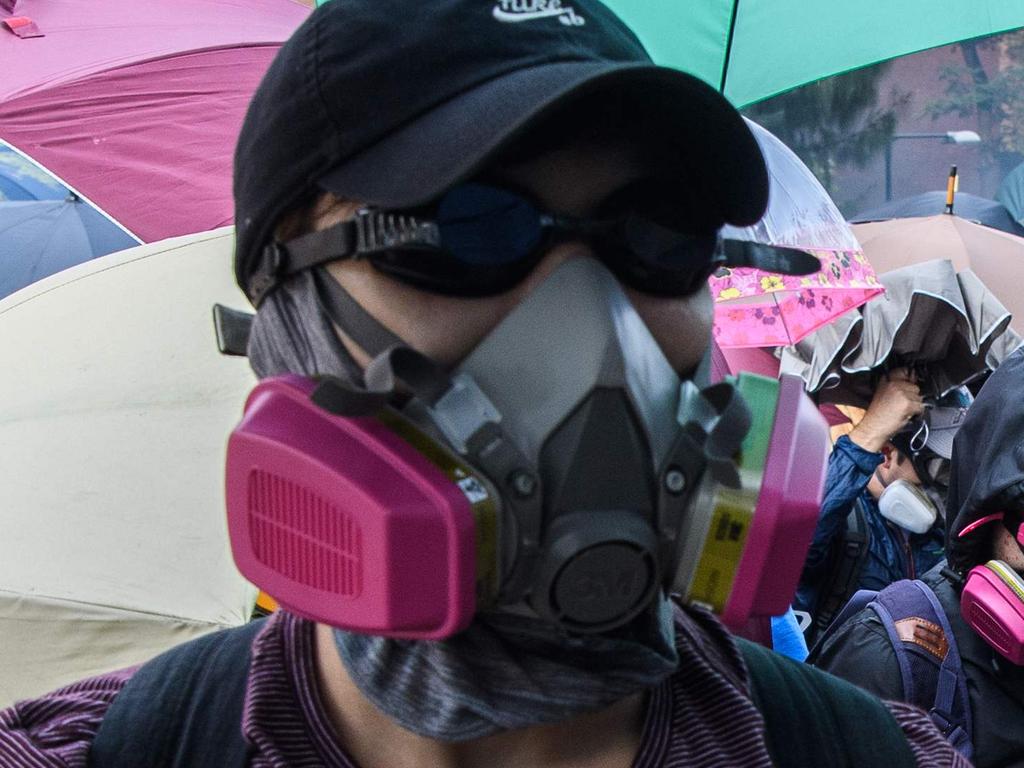
To join the conversation, please log in. Don't have an account? Register
Join the conversation, you are commenting as Logout